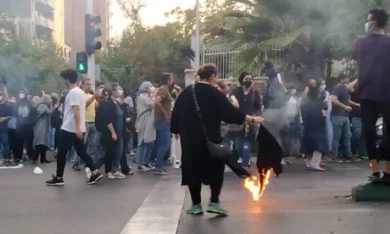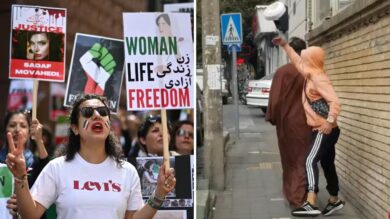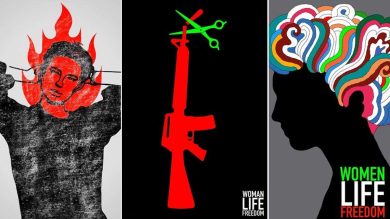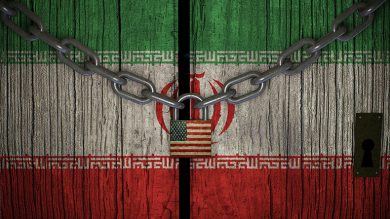The Islamic Revolutionary Guard Corps (IRGC) is one of the most powerful military and political forces in the Middle East. It controls Iran’s ballistic missile program, funds regional militias, oversees economic empires, and crushes dissent with ruthless efficiency. Yet, of all the forces that threaten its grip on power, one has proven to be uniquely powerful — Iranian women.
For the IRGC, women are not just citizens to be controlled; they are symbols — of identity, morality, and national loyalty. And when women reject the state’s authority over their bodies, voices, and choices, they don’t just protest. They challenge the ideological foundation of the regime.
This article explores why the IRGC fears women so deeply, from the streets of Tehran to international courtrooms, and how women have become the most formidable threat to its authority.
1. The Female Body as a Political Battleground
From the inception of the Islamic Republic in 1979, the Iranian state has placed women at the center of its ideological project.
Key Policies:
• Mandatory hijab enforcement in public spaces
• Gender segregation in education, sports, and workplaces
• Legal inequality in family law, inheritance, and custody
• Bans on women singing solo, attending stadiums, or appearing without hijab on television
The IRGC and its affiliated Basij militia are tasked with enforcing these rules, not just through laws, but through surveillance, harassment, and punishment.
The regime’s control of women is both symbolic and structural — and that’s why defiance is seen as rebellion.
2. Mahsa Amini and the Uprising That Shook the Regime
On September 16, 2022, 22-year-old Mahsa (Jina) Amini died in the custody of Iran’s morality police after being arrested for “improper hijab.” Her death sparked the most significant protests in decades.
What Followed:
• Nationwide uprisings under the slogan “Woman, Life, Freedom”
• Schoolgirls removing their hijabs and chanting against the Supreme Leader
• Women leading marches, setting headscarves on fire, and confronting Basij officers
The IRGC’s response was brutal:
• Over 500 killed, thousands arrested
• Internet blackouts and mass surveillance
• Targeted detentions of female journalists, students, medics, and artists
The regime saw these protests not just as unrest — but as existential rebellion.
3. Why the IRGC Fears Women’s Defiance
A. Ideological Subversion
The Islamic Republic’s legitimacy is built on controlling morality — and morality is built on controlling women’s bodies.
When women reject that control, they undermine the regime’s religious and political authority.
B. Uncontainable Visibility
A woman removing her hijab in public becomes a global image of resistance.
The regime can suppress information, but it cannot erase a symbol once it spreads online.
C. Mass Mobilization
Women’s protests bring together intersections of struggle: gender, class, ethnicity, labor.
From students to mothers to Kurdish activists, their unity makes repression harder and costlier.
4. The Basij and the War on Women
The IRGC relies heavily on its Basij militia, a paramilitary force used to patrol streets, monitor schools, and break protests.
Basij Actions Against Women:
• Physical assaults for “improper dress”
• Infiltrating universities and student movements
• Coordinating arrests with IRGC Intelligence
• Participating in surveillance, beatings, and sexual violence during detentions
Basij women are often used to justify state repression — but many former members have since leaked information or defected, exposing the system’s inner workings.
5. Women in Evin: Political Prisoners as Leaders
Many of Iran’s most high-profile political prisoners are women — targeted not for crimes, but for courage.
Notable Prisoners:
• Narges Mohammadi: Human rights advocate and 2023 Nobel Peace Prize laureate
• Sepideh Qoliyan: Labor activist arrested, tortured, and re-arrested
• Yasaman Aryani, Monireh Arabshahi, Atena Daemi: All imprisoned for opposing compulsory hijab
Inside prison, these women:
• Lead hunger strikes
• Publish letters smuggled to the outside
• Document torture and sexual abuse
• Inspire international campaigns for justice
For the IRGC, these women are unbreakable threats — because they expose the regime’s crimes with their voices, not violence.
6. Gendered Repression: How the IRGC Uses Sexual Violence
Sexual violence is used by the IRGC not just as a tool of punishment, but as a form of social control.
Documented Tactics:
• Strip searches and forced virginity tests
• Sexual assault during interrogations
• Filmed “confessions” used as blackmail
• Rape and humiliation threats against detainees and their families
This is designed to:
• Silence dissenters through trauma
• Stigmatize survivors, discouraging future protest
• Reinforce patriarchal power and moral intimidation
Women who speak out — like Armita Abbasi — become symbols of both state cruelty and feminist resistance.
7. Digital Feminism and the Cyber War
The IRGC is deeply invested in cyber surveillance, particularly against feminist activism online.
Digital Attacks Include:
• Hacking of Instagram and Telegram accounts
• Phishing emails to track devices
• Online harassment campaigns by regime bots
• Disinformation targeting exiled female journalists and influencers
Movements like:
• #WhiteWednesdays
• #MyStealthyFreedom
• #No2Hijab
…have mobilized millions of Iranians and exiles, building a global feminist consciousness that terrifies the regime.
8. Courtroom Resistance: Women Are Suing the IRGC
Legal action is becoming one of the newest and boldest frontiers of resistance.
Examples:
• Women survivors of IRGC detention have filed lawsuits in European courts under universal jurisdiction.
• Iranian exile organizations are building legal cases around:
• Torture
• Rape in custody
• Arbitrary arrest and gender persecution
Efforts are underway in Germany, Sweden, Norway, the UK, and the International Criminal Court to:
• Hold IRGC commanders accountable
• Prosecute crimes against humanity
• Expose systemic sexual abuse
Women are no longer just protesting — they are prosecuting.
9. Women in the Diaspora: Speaking Loud, Living Brave
From London to Toronto to Berlin, Iranian women abroad are organizing protests, lobbying governments, and demanding IRGC designation.
Leading Voices Include:
• Masih Alinejad: Journalist targeted by an IRGC kidnapping plot
• Hengameh Ghaziani and Taraneh Alidoosti: Celebrities risking careers to support protestors
• Lawyers, academics, and former prisoners documenting abuses and lobbying for justice
Their activism is often met with:
• IRGC surveillance
• Threats to families in Iran
• Disinformation and smear campaigns
Still, they persist — because freedom in exile means nothing if those at home remain in chains.
10. Why This Fight Is Far from Over
Despite the crackdown, Iranian women continue to resist:
• Girls in schools still defy hijab rules
• Mothers of slain protesters lead public vigils
• Female workers strike for wages and dignity
• Prisoners write — even from solitary confinement
The IRGC can raid homes, shut down protests, and control the media.
But it cannot unwrite a revolution that began with a woman’s death and lives in every woman who dares to fight back.
Conclusion: The Regime’s Fear Is Its Weakness
Why does the IRGC fear women?
Because women reject the system at its root.
Because their defiance cannot be defeated with bullets.
Because their courage exposes the regime’s cruelty.
Because their struggle is not just political — it’s existential.
Iranian women are not waiting to be saved.
They are making history — in the streets, in the prisons, in the courtrooms.
And one day, they will return to those very courts — not as the accused, but as the accusers.
This is why the IRGC fears women. And this is why it should.
Join Our Newsletter!
Stay informed with the latest updates, news, and ways to take action in the fight for justice and global security. Sign up now to get updates delivered straight to your inbox!





